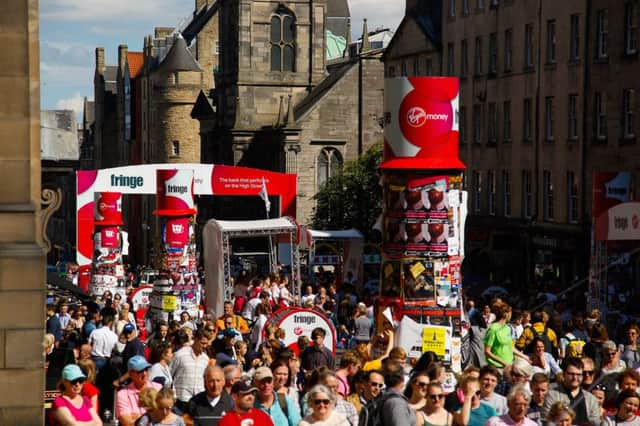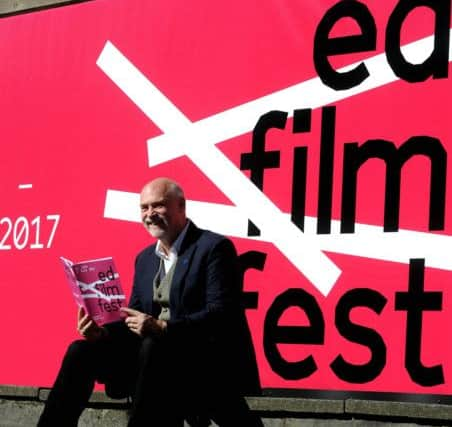Bid to '˜spread out' Edinburgh festivals wins backing


Edinburgh World Heritage wants the city to conduct an experiment of staging its major events at different times to ensure the Capital properly balances the needs of local residents and businesses.
It believes Edinburgh’s main tourism season could be extended if the move is introduced as part of an agreed plan for protecting the historic heart of the city.
Advertisement
Hide AdAdvertisement
Hide AdThe conservation charity has drawn comparisons between Edinburgh, which hosts most of its festivals in August, and Genoa, which decided to spread its events throughout the year as part of a new strategy for the Italian city.


Edinburgh World Heritage sparked controversy last month by saying the city needed to take action to avoid it “suffering the same fate” as Venice, which it described as a “hollow museum shell”. At the time, it said work needed to be done “to better understand the capacity limits of our fragile, historic city”.
It has backed the suggestion of “stretching out” the festivals from June through to September to ease congestion in the city centre, help visitors find accommodation and allow more locals to attend events. The suggestion has been put forward by Edinburgh MP Tommy Sheppard.
He has called for a “big think” to be instigated by the city council and has urged the authority to “take a lead” on the debate.


Adam Wilkinson, director of Edinburgh World Heritage, said: “If changes are made and they don’t work out, you can always move them back.
“Our colleagues in Genoa made a point of spreading their main cultural events across the year as part of their overall tourism plan with the clear objective of lengthening the tourism season.
“Piecemeal changes without a clear plan agreed across the city (including its residents) would, however, be illogical.
Advertisement
Hide AdAdvertisement
Hide Ad“I think these ideas are worth exploring as part of a wider, co-ordinated approach to the visitor economy of the city, and understanding what will be best for the city as a whole, balancing the needs of residents and the needs of the businesses that sustain the city’s wider economy.”
Edinburgh World Heritage, the city council, VisitScotland, Marketing Edinburgh and the Edinburgh Hotels Association are all represented on the Edinburgh Tourism Action Group (ETAG).
Its most recent strategy, published last year, warns that a “failure” to address the large variation of visitor numbers between the peak season and the surrounding months in Edinburgh was one of the biggest barriers to further growth and to increasing the sustainability of the tourism sector.
The 2020 industry blueprint also states: “The popularity of Edinburgh’s core Old and New Town area is creating increasing challenges as visitor numbers grow, resulting in a high density of visitors during peak periods.
“There is a danger that this will start to impact of the quality of the visitor experience and create friction between the local residents and the tourism sector, as well as limiting growth due to capacity issues.
“While Edinburgh provides a very high level of visitor experience, there are elements that must be improved, particularly wi-fi access, wayfinding and the cleanliness and quality of environment. Failure to deliver on these hygiene factors is a threat to future growth.”
Mr Wilkinson added: “There’s an ebb and flow to the city. At some times of the year, there is peace and quiet, and at other times there is madness. Some people celebrate it and others run and hide.
Advertisement
Hide AdAdvertisement
Hide Ad“But there are bigger questions over what kind of city we are and what kind of city does Edinburgh want to be.
“There is an enormous challenge for the city council at the moment at this time of year.
“They have all the responsibilities for infrastructure, but don’t get any financial benefit from the festivals being here, from what I can tell.
“It ends up with local residents and businesses footing the bill for the clean-up and everything else. There is an issue over who benefits the most from the sheer number of visitors here.”
Manuela Calchini, regional director of VisitScotland, said: “While some interesting points have been raised regarding changes to dates, the simultaneous nature of the festivals in August is what helps to create an atmosphere that cannot be matched anywhere in the world.
“With an amazing array of actors, comedians, authors, singers, dancers, street performers, and musicians descending upon it, it is a truly special time for Scotland’s Capital.
“Ensuring the city’s tourism industry remains sustainable is essential and of particular importance at this time of year. VisitScotland is committed to working closely with partners, and with the city council, to make sure Edinburgh remains a must-visit destination for future generations of holidaymakers.”
Advertisement
Hide AdAdvertisement
Hide AdJohn Donnelly, chief executive of Marketing Edinburgh, said: “Every August, Edinburgh transforms into the world’s festival city, a vibrant melee, bursting with atmosphere and showcasing the very best in arts, culture and comedy.
“Edinburgh’s festivals are a signature global event that the city is proud and lucky to have each year. While the festivals are a huge draw for visitors, they are not the only reason why tourists choose this time of year to come and explore the city.
“Across the UK and beyond, August is the peak time that people enjoy their annual holidays. Given that the city’s historic appeal is by far the number one reason visitors give for choosing Edinburgh as a destination, followed by our attractions, I am not convinced extending the festivals across the summer months would have a significant impact.”
A spokeswoman for the city council said: “As the pre-eminent festival city that welcomes artists, technicians, authors, conductors and visitors from across the world at a peak time for international holidays, Edinburgh is especially lucky to be able to welcome children and their families to the summer festivals both during holiday time and during term time.
“We believe this offers the best of both worlds but we support taking other views into account. Ultimately, the dates are set by the festival organisers.”
Two of the city’s long-running events – the film and jazz festivals – have moved out of August in the last ten years to slots in June and July respectively.
However, the Edinburgh International Festival only brought its dates back into line with the Fringe in 2015 nearly two decades after a controversial shake-up saw the “open access” event brought forward to ensure that it ended on the last weekend in August – an English bank holiday.
Advertisement
Hide AdAdvertisement
Hide AdSome Fringe promoters are in favour of a change after noticing a dip in ticket sales during the last two weeks of shows once the Scottish school holidays have ended.
However, there is understood to be reluctance within the Fringe Society to stage the event any earlier due to a desire to avoid any unnecessary upheaval so soon after the EIF’s dates switch. The Fringe sparked a bitter row in 1998 when it decided to move a week earlier in the calendar to try to attract bigger audiences. The two events had been running together since 1947.
